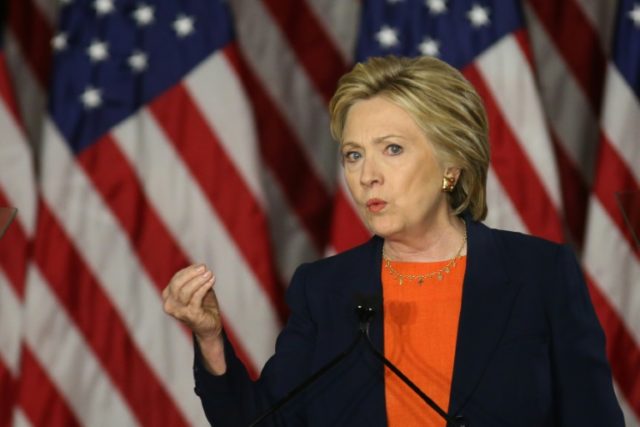Washington (AFP) – Here are key points from FBI Director James Comey’s news conference Tuesday announcing the findings from the agency’s investigation into Hillary Clinton’s use of a private email account while serving as secretary of state.
Recommendation
Comey said the FBI’s investigation does not support criminal prosecution despite evidence of potential violations of laws regulating the handling of classified information.
“Our judgment is that no reasonable prosecutor would bring such a case,” he said.
Prosecutors need to show “clearly intentional and willful mishandling of classified information” or a large amount of mishandled information to indicate “intentional misconduct” or “disloyalty to the United States or efforts to obstruct justice.”
He noted there was no evidence of that in Clinton’s case.
Classified information
Of the 30,000 emails that Clinton turned over to investigators, 110 messages in 52 email chains were found to have contained classified information at the time they were sent or received.
— eight chains contained top secret information
— 36 chains contained secret information
— eight chains contained confidential information, the lowest classification.
Another 2,000 emails were “up-classified” to confidential after the fact.
Investigators recovered thousands of other emails that were not provided by Clinton’s attorneys. Of those, three contained information that was classified at the time: one at the secret level and two at the confidential level.
Missing emails
Investigators found “no evidence” that Clinton’s camp intentionally deleted messages in an effort to conceal them, Comey said.
The thousands of emails that investigators recovered that were not part of the 30,000 turned over were found on various devices, in the email archives of recipients and in the unused space of a decommissioned server.
The FBI conclusion was that — like many email users — Clinton periodically deleted emails and other messages were deleted when she changed devices.
Her private server — unlike government or commercial email servers — did not archive any messages.
‘Extremely careless’
Comey said that while there was no clear evidence that Clinton and her aides intended to violate secrecy laws, “there is information that they were extremely careless in their handling of very sensitive, highly classified information.”
Hackers?
FBI investigators did not find proof that Clinton’s email had been successfully hacked, but Comey noted that sophisticated operators would not have left evidence behind.
However, hackers did access the commercial email accounts of people that Clinton regularly corresponded with, Comey said.
Clinton also used her personal email “extensively” while in “the territory of sophisticated adversaries,” he said.
“Given that combination of factors, we assess it is possible that hostile actors gained access to Secretary Clinton’s personal email account.”
Independent investigation
With the FBI probe coming in the midst of a pitched election battle, Comey stressed that his agency’s investigation was totally independent.
Of the debate swirling over the email scandal, “none of that mattered to us. Opinions are irrelevant… Only facts matter, and the FBI found them here in an entirely apolitical and professional way.”
He also noted that the FBI had not coordinated or reviewed its findings with the Justice Department: “They do not know what I am about to say.”
Next steps
The case now goes to the Justice Department, which will take into consideration the FBI’s recommendation but ultimately has the final say in whether Clinton should be prosecuted.
Attorney General Loretta Lynch, under scrutiny for an impromptu meeting last week with Clinton’s husband Bill, said Friday she would accept the decision of prosecutors on whether to bring charges in the case.

COMMENTS
Please let us know if you're having issues with commenting.